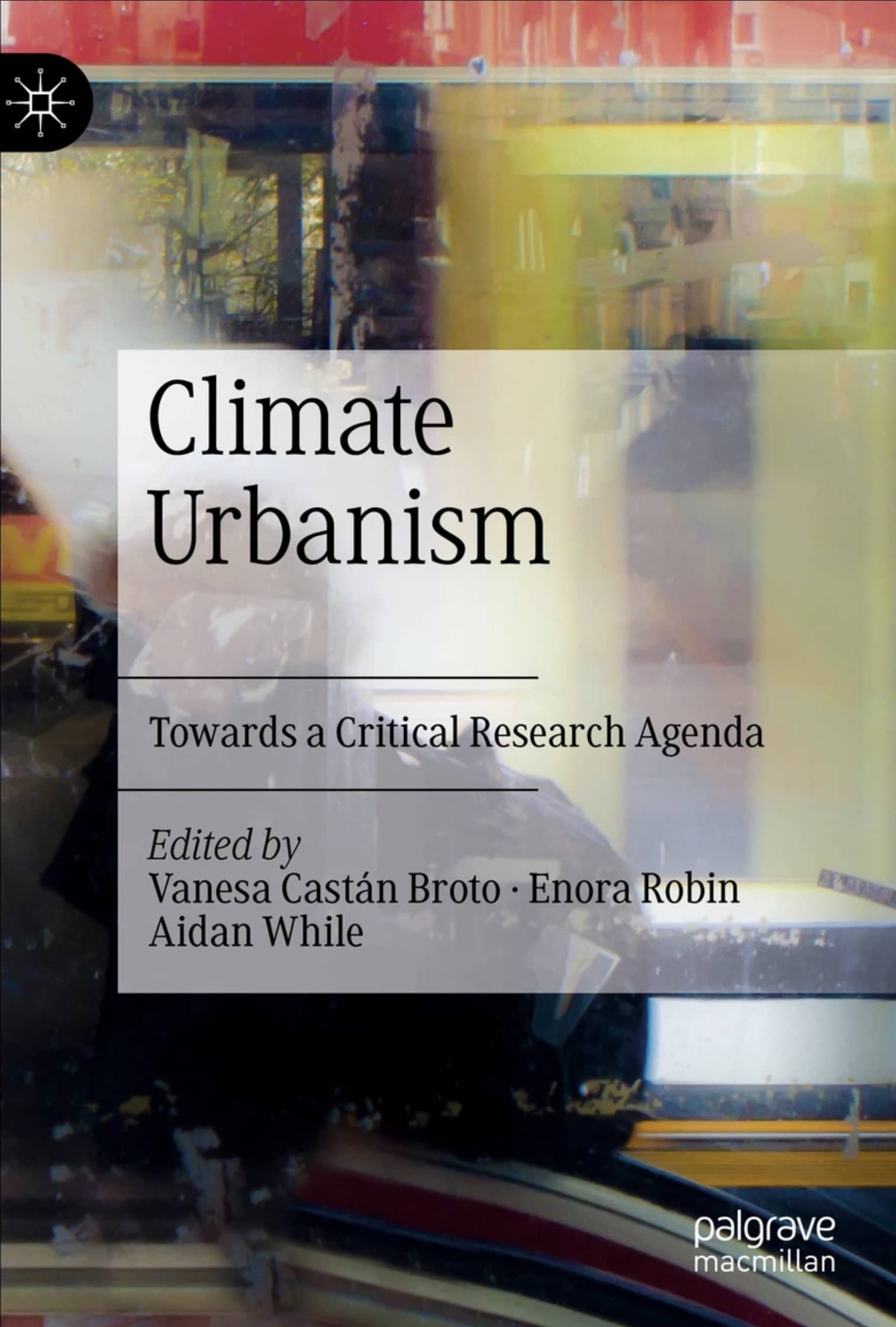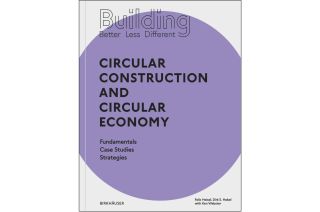
www.buildingsandcities.org/insights/reviews/climate-urbanism.html
Climate Urbanism: Towards a Critical Research Agenda
Edited by: Vanesa Castán Broto, Enora Robin, Aidan While. Palgrave Macmillan, 2020, ISBN: 978-3-030-53386-1
Laura Tozer reviews this novel and thought-provoking book examining how climate urbanism is being embraced, promoted and contested. The book is a must read for researchers, policymakers, students and practitioners aiming to explore how climate action can move from being reactive to being transformative and more equitable.

Climate change transforms the ways that we live in and govern cities. The rise of climate change on the urban agenda means that climate-change politics are driving new modes of urbanism. In this context, this book thoughtfully navigates a dialogue among scholars that tackles the tension in urban climate action about whether it is, or will be, transformative or exclusionary. Central to this book is a call to recognise and critique the ways that climate action is used in defence of the existing economic status quo but not at the expense of seeking to improve our understanding about how urban climate action could create new alternatives. This book is a novel and thought-provoking contribution examining how climate urbanism is opening up new alternatives.
The contributors to this book unpack the concept of 'New Climate Urbanism' as a new mode or way of being for cities in the context of a climate-changed world. The book argues that urban life needs to be rethought and reoriented as climate change dramatically reshapes how we understand, imagine, live and intervene in cities. The range of chapters make clear, however, that there is a broad field to map that addresses a range of geographies and contexts marked by disagreements on the transformative potential of New Climate Urbanism. The book represents not only a wealth of case studies for researchers and students looking for the cutting edge, but also an impressive collection of theoretical analyses drawing on different epistemologies from across urban climate change politics and governance scholarship. Readers will benefit from reading this nuanced navigation through some of our best efforts to date aiming to understand how to make climate action more equitable. Particularly striking was the thread weaving through the book arguing that we should recognise the dangers of closing down imagination and failing to see the potential seeds of transformative change planted in climate action that is mundane rather than flashy.
The first part of the book explores the nature of climate urbanism and the chapters outline features in different locations and epistemological traditions. The second part focuses on climate urbanism and transformative action and is composed of critical perspectives on the transformative potential of climate urbanism, especially to challenge existing social injustices. The third part examines the knowledge politics of climate urbanism to understand climate urbanism as a knowledge-mobilising process and to analyse the knowledge paradigms currently underpinning climate and urban science. The fourth part seeks to understand ways to deliver climate urbanism as a new communal project and explores the role of citizens and non-state actors in driving transformative climate urbanism.
Three main modalities are proposed to sort the wide-ranging contributions and their understandings about how climate urbanism is developing and what could happen in the future: entrepreneurial, reactive, and transformative. An entrepreneurial perspective sees new climate urbanism as expanding and protecting capitalist urban economic functions. Here scholars examine how climate action pathways reproduce neoliberal forms of urban development (as Shi examines in chapter 4) and engages with the many actors that see climate action as an economic opportunity (as elaborated by McKendry in chapter 9).
However, the editors argue that much of climate urbanism has been reactive rather than entrepreneurial and it has worked to defend the existing economic status quo. As Long, Rice, and Levenda argue (chapter 3), a reactive approach is not socially neutral and leads to the protection of wealthy property interests. The authors argue that these approaches dominate climate urbanism and that a more transformative approach means addressing not just material causes of climate change, but also underpinning drivers like settler colonialism and racial capitalism. Climate urbanism is also reactive, as Olazabal (chapter 10) points out, because urban actors do not have the evidence on climate risks necessary for robust planning.
Other chapters in the book are engaged in understanding what more socially transformative approaches could look like. Robin, Westman and Castán Broto (chapter 2) argue for a 'minor perspective on climate urbanism' that diagnoses current issues, but also sees opportunity in the diversity of climate responses represented in the 'mundane contexts of action'. Pickerill (chapter 14) finds hope and promises in the practices of eco-communities created through resident-led innovation as a source of insight into how to disrupt the status quo. Patterson (chapter 7) calls for future research prescribing what should be done in principle to integrate better understandings of processes of change, remaking the rules currently in use, and the consequences of deliberate action in different contexts. A key challenge in this field of research will be to reframe the relationship between climate action and the urban environment to spark transformative change.
Emerging from the book is a central concern, and deep contradictions, about whether New Climate Urbanism will empower marginalised communities to shape future urban climate action. Clearly climate action in cities has tended to maintain dynamics of exclusion. The dialogue among the chapter authors grapples with a key question - 'can anyone deliver alternative models of climate urbanism that include vulnerable groups and that address the entrenched inequalities that create vulnerabilities in the first place?' (Castán Broto, Robin and While p. 251).
Practitioners and researchers grappling with these challenges should read this book to not only understand how current urban climate action is lacking, but to gain some insight into working towards more equitable climate action. The editors leave us with hope that feminist and postcolonial theories can help to move beyond a critique of neoliberalism to understand processes of systemic change. There is a clear need to continue to push back on new injustices created through urban climate policy, as well as pursue pathways to transformative change navigating towards multiple futures.
Latest Peer-Reviewed Journal Content
Energy sufficiency, space temperature and public policy
J Morley
Living labs: a systematic review of success parameters and outcomes
J M Müller
Towards a universal framework for heat pump monitoring at scale
J Crawley, L Domoney, A O’Donovan, J Wingfield, C Dinu, O Kinnane, P O’Sullivan
Living knowledge labs: creating community and inclusive nature-based solutions
J L Fernández-Pacheco Sáez, I Rasskin-Gutman, N Martín-Bermúdez, A Pérez-Del-Campo
A living lab approach to co-designing climate adaptation strategies
M K Barati & S Bankaru-Swamy
Mediation roles and ecologies within resilience-focused urban living labs
N Antaki, D Petrescu, M Schalk, E Brandao, D Calciu & V Marin
Negotiating expertise in Nepal’s post-earthquake disaster reconstruction
K Rankin, M Suji, B Pandey, J Baniya, D V Hirslund, B Limbu, N Rawal & S Shneiderman
Designing for pro-environmental behaviour change: the aspiration–reality gap
J Simpson & J Uttley
Lifetimes of demolished buildings in US and European cities
J Berglund-Brown, I Dobie, J Hewitt, C De Wolf & J Ochsendorf
Expanding the framework of urban living labs using grassroots methods
T Ahmed, I Delsante & L Migliavacca
Youth engagement in urban living labs: tools, methods and pedagogies
N Charalambous, C Panayi, C Mady, T Augustinčić & D Berc
Co-creating urban transformation: a stakeholder analysis for Germany’s heat transition
P Heger, C Bieber, M Hendawy & A Shooshtari
Placemaking living lab: creating resilient social and spatial infrastructures
M Dodd, N Madabhushi & R Lees
Church pipe organs: historical tuning records as indoor environmental evidence
B Bingley, A Knight & Y Xing
A framework for 1.5°C-aligned GHG budgets in architecture
G Betti, I Spaar, D Bachmann, A Jerosch-Herold, E Kühner, R Yang, K Avhad & S Sinning
Net zero retrofit of the building stock [editorial]
D Godoy-Shimizu & P Steadman
Co-learning in living labs: nurturing civic agency and resilience
A Belfield
The importance of multi-roles and code-switching in living labs
H Noller & A Tarik
Researchers’ shifting roles in living labs for knowledge co-production
C-C Dobre & G Faldi
Increasing civic resilience in urban living labs: city authorities’ roles
E Alatalo, M Laine & M Kyrönviita
Co-curation as civic practice in community engagement
Z Li, M Sunikka-Blank, R Purohit & F Samuel
Preserving buildings: emission reductions from circular economy strategies in Austria
N Alaux, V Kulmer, J Vogel & A Passer
Urban living labs: relationality between institutions and local circularity
P Palo, M Adelfio, J Lundin & E Brandão
Living labs: epistemic modelling, temporariness and land value
J Clossick, T Khonsari & U Steven
Co-creating interventions to prevent mosquito-borne disease transmission in hospitals
O Sloan Wood, E Lupenza, D M Agnello, J B Knudsen, M Msellem, K L Schiøler & F Saleh
Circularity at the neighbourhood scale: co-creative living lab lessons
J Honsa, A Versele, T Van de Kerckhove & C Piccardo
Positive energy districts and energy communities: how living labs create value
E Malakhatka, O Shafqat, A Sandoff & L Thuvander
Built environment governance and professionalism: the end of laissez-faire (again)
S Foxell
Co-creating justice in housing energy transitions through energy living labs
D Ricci, C Leiwakabessy, S van Wieringen, P de Koning & T Konstantinou
HVAC characterisation of existing Canadian buildings for decarbonisation retrofit identification
J Adebisi & J J McArthur
Simulation and the building performance gap [editorial]
M Donn
Developing criteria for effective building-sector commitments in nationally determined contributions
P Graham, K McFarlane & M Taheri
Join Our Community

The most important part of any journal is our people – readers, authors, reviewers, editorial board members and editors. You are cordially invited to join our community by joining our mailing list. We send out occasional emails about the journal – calls for papers, special issues, events and more.
We will not share your email with third parties. Read more



Latest Commentaries
COP30 Report
Matti Kuittinen (Aalto University) reflects on his experience of attending the 2025 UN Conference of the Parties in Belém, Brazil. The roadmaps and commitments failed to deliver the objectives of the 2025 Paris Agreement. However, 2 countries - Japan and Senegal - announced they are creating roadmaps to decarbonise their buildings. An international group of government ministers put housing on the agenda - specifying the need for reduced carbon and energy use along with affordability, quality and climate resilience.
Building-Related Research: New Context, New Challenges
Raymond J. Cole (University of British Columbia) reflects on the key challenges raised in the 34 commissioned essays for Buildings & Cities 5th anniversary. Not only are key research issues identified, but the consequences of changing contexts for conducting research and tailoring its influence on society are highlighted as key areas of action.